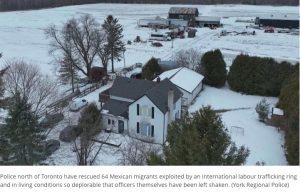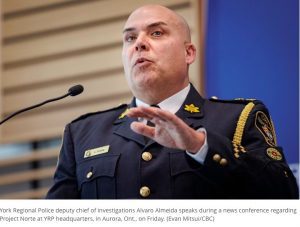Police lay charges against seven people for their part in a human trafficking ring after a tip from a single worker. Police allege the accused brought 64 people into Canada, for cheap labour, where they were forced to live and work in deplorable conditions.
It began with a tip from a single foreign worker.
Now, police north of Toronto say they have rescued 64 Mexican migrants exploited by an international labour trafficking ring and in living conditions so deplorable that officers themselves have been left shaken.
On Feb. 8, police acting on search warrants in East Gwillimbury, Vaughan, Toronto and Mississauga located dozens of workers who they say were lured to Canada with promises of a better future. Instead, they were given mattresses on the floor, housed with dozens in bug-infested rooms, faced threats and, in some cases, say police, sexual assault.
“These workers are coerced with promises of a better life, decent wages, quality housing and eventually documentation. These are almost always false promises,” York Regional Police Deputy Chief Alvaro Almeida told reporters on Friday.
One foreign worker — not the one who blew the whistle — spoke to CBC News in the days following the raid, and described the squalid housing he and others were forced to pay for out of their wages.
The man, in his 20s, was a farm worker, but managed to leave before the police raid. CBC News has agreed to protect his identity because he fears deportation.
At 5 a.m. each morning, he said a bus would take the workers to a farm where they would pack vegetables. At the end of the week, he says he would be left just $50 in a cash envelope — after deductions for transportation and lodging.
At the Toronto duplex where he was housed, there were six to eight workers in a room, pairs of two sharing a mattress, he said in Spanish.
“We really came to suffer from deception by those who hired us, with extensive work hours and sleeping in dirty places with cockroaches and bedbugs… These were the daily conditions we faced.”
5 charged, 2 more wanted
The investigation began in November 2022 after one Mexican national contacted police, police said at a news conference.
Over the next three months, investigators spoke with several others who provided similar accounts and found they’d been exploited by a trafficking ring operating not only in York Region but across the Greater Toronto Area, police said. Workers were living in squalor, forced to work long hours with little pay and bussed in to work at farms, factories and warehouses, all while their exploiters lived lives of luxury, police allege.

The names of those businesses have not yet been released as the Ontario Ministry of Labour continues its investigation.
Five people have been arrested, including two Canadian citizens and three Mexican nationals, facing 44 charges between them including human trafficking, materially benefiting from trafficking people and participating in a criminal organization, among others.
Two others remain wanted.
As for the foreign workers, police say Spanish-speaking officers from York Regional Police as well as police in Peel, Toronto and the Ontario Provincial Police explained what was happening and offered workers support. Of the 64 workers found, 53 accepted the help and continue to be supported, police say.
Officers saw themselves in those seeking ‘better life’
“To see the state of the workers’ living conditions, considering the promises that were made to them, was heartbreaking,” said York police Chief Jim MacSween.
“The Spanish-speaking officers who assisted in the investigation were also deeply affected, as they could see the reflections of their own families and friends in the faces of these hardworking people who were only trying to find a better life.”

Exactly how they were recruited in Mexico remains under investigation, police say.
Almeida said he knows labour trafficking victims may be afraid to come forward, afraid to seek help for fear they’ll be arrested and deported.
To anyone in that position he said, “We’re here to help.”
But one advocate says Canada’s own immigration system has serious gaps that can leave migrant workers fearful about coming forward about the exploitation they face.
‘A systemic issue,’ advocate says
“What we see often in situations like this is that police come in, do a big splash, call it human trafficking … and within a few weeks, workers are being deported,” said Syed Hussan, executive director of the Migrant Workers Alliance of Canada.
Rather than police, who lack the tools to secure rights for exploited workers, immigration, housing and labour authorities should work to ensure the workers aren’t doubly punished, first by being exploited and then by being removed from Canada, he said.
“This is a systemic issue…. Many migrants are facing these issues because they don’t have permanent residence rights,” said Hussan.
The federal government has said it is working on a regularization program to grant status to undocumented migrants in Canada, but Hussan says despite making that promise over a year ago, there’s been no update.
“We’re calling on the federal government to not delay,” he said.
But no matter their status, he says, if workers were brought to Canada under false pretences, the federal government should act to secure them proper work permits.
“Our concern is what will happen to the workers after the spotlight shifts and the police move on.”
But Cynthia Moreno of the Consulate General of Mexico in Toronto says she expects the workers will likely have some status in Canada.
“If they are potential victims, that guarantee comes first, the guarantee of their rights as victims.”
